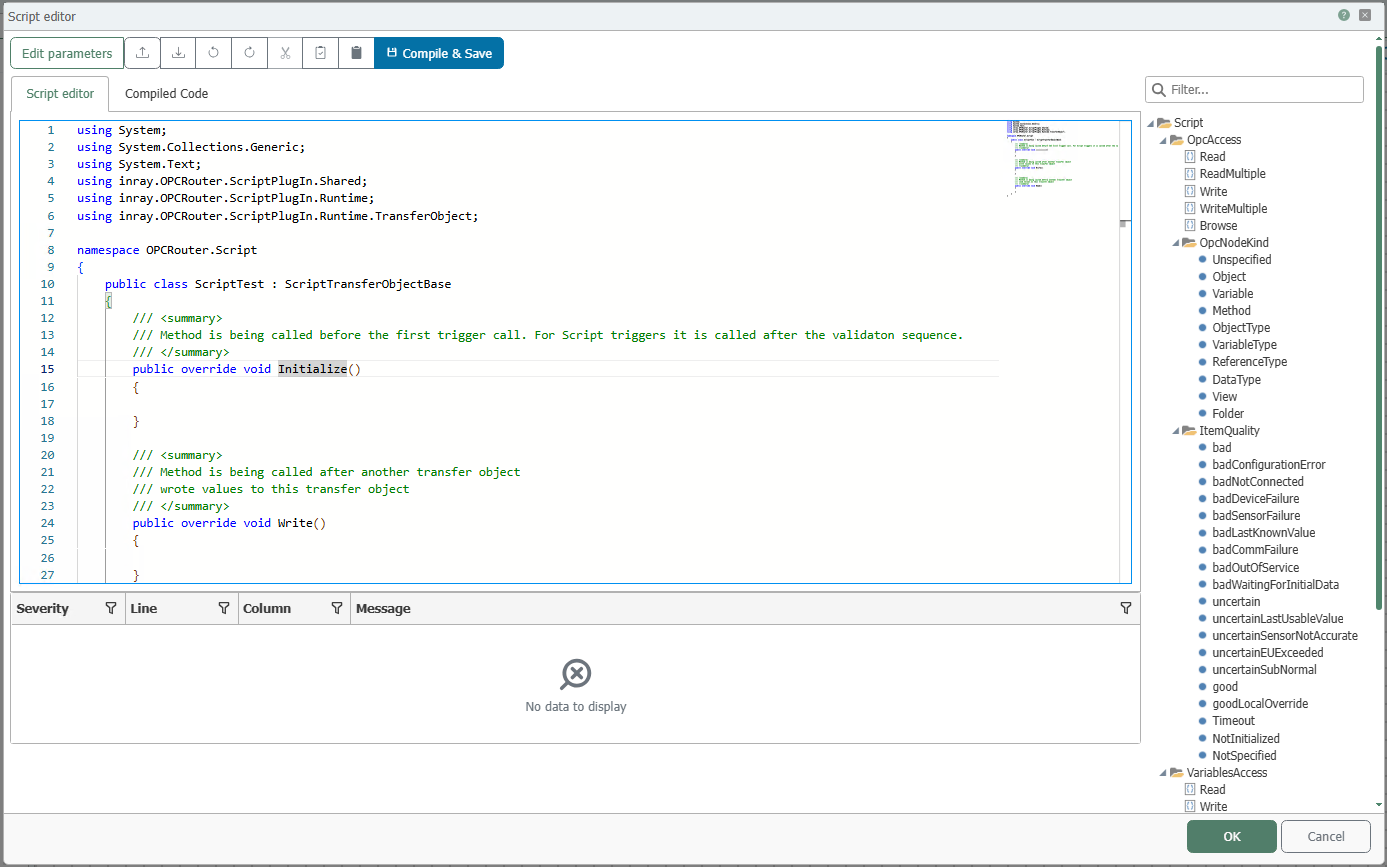Editor

Script editor
In addition to standard operating functions (copy, paste, cut, undo, save), the editor offers some special functions:
- Menu “File – Save externally”: Saves the script as an XML file with header data, code, and parameter definitions. Opening such XML files and thus importing scripts is also possible.
Note: If you want to use the assemblies in the scripts, they must still be included in the code with using.
- Menu “Settings – Edit parameter”: Here you create required parameters and variables (s. Transfer object script und Trigger).
- Menu “Settings – Edit comment”: The comment is displayed in the script list of the plug-in.
- “F6” key compiles and tests the program for errors.
The right-hand part of the window contains a graphic programming aid for OPC access, variables from the OPC Router configuration, log messages and parameters.
- Double-click an entry and the prepared line of code will be inserted. Entries can be written as a string (in quotation marks) or as a predefined variable.
OpcAccess.Read
Reads the value of an OPC item.
Object <myValue\> = OpcAccess.Read("<ItemPath\>", "<OPCServerName\>")
- Return: Object
- ItemPath: Access path and name of the item
- OPCServerName: Name of the OPC connection in the router project
OpcAccess.ReadMultiple
Reads out the value of several OPC items.
List<string> <lItemNames\> = new List<string> ();
<lItemNames\>.Add ("<ItemPath.ItemName1\>");
<lItemNames\>.Add ("<ItemPath.ItemName2\>");
...
Dictionary<string,object> <MyValues\> = OpcAccess.ReadMultiple(<lItemNames\>, "<OPCServerName\>");
- Return: Dictionary <string>
- lItemNames: Access paths and names of the items as a list
- OPCServerName: Name of the OPC connection in the router project
OpcAccess.Write
Writes a value to an OPC item.
OpcAccess.Write ("<ItemPath\>", <objValue\>, "<OPCServerName\>")
- Return: none
- ItemPath: Access path and name of the item
- objValue: value to be written
- OPCServerName: Name of the OPC connection in the router project
OpcAccess.WriteMultiple
Writes several values into several OPC items.
Dictionary<string,object> <dicItemsToWrite\> = new Dictionary<string,object> ();
<dicItemsToWrite\>.Add("<ItemPath.ItemName1\>", <Value1\>);
<dicItemsToWrite\>.Add("<ItemPath.ItemName2\>", <Value2\>);
...
OpcAccess.WriteMultiple(<dicItemsToWrite\>, "<OPCServerName\>")
- Return: none
- dicItemsToWrite: Dictionary with items and values
- OPCServerName: Name of the OPC connection in the router project
OpcAccess.Browse
Offers the possibility to perform a browse (object search) for OPC DA and UA connections.
ItemPath: Access path and name of the item
ServerName: Name of the OPC connection in the router project
Various queries are at your disposal:
OpcAccess.Browse(ItemPath, ServerName).Select(e => e.DisplayName).ToArray()
- Return: Specifies the names of the tags from this OPC path.
OpcAccess.Browse(ItemPath, ServerName).Select(e => e.NodeKind.ToString()).ToArray()
- Return: The type of tags from this OPC path.
OpcAccess.Browse(ItemPath, ServerName).Select(e => e.Identifier).ToArray()
- Return: The name of the tags with full path.
OpcAccess.Browse(ItemPath, ServerName).Select(e => e.HasChildren).ToArray()
- Return: If the tags still have child objects.
VariablesAccess.Read
Reads out the value of a variable of the OPC Router project. What is meant here are only variables created via the variable plug-in, ie no placeholders in templates, mail objects or similar. If the variable does not exist, NULL is returned.
Object <myValue\> = VariablesAccess.Read("<VariableName\>")
- Return: Object
- VariableName: Variable name in the OPC Router project
VariablesAccess.Write
Assigns a value to a tag of the OPC Router project. What is meant here are only variables created via the variable plug-in, ie no placeholders in templates, mail objects or similar. If the variable does not exist, it will be recreated.
VariablesAccess.Write("<VariableName\>", Value)
- Return: none
- VariableName: Variable name in the OPC Router project
- Value: Value assigned, Object
Log
Schreibt eine Nachricht in die Logdatei
Log("<strMessage\>", MessageType.<LogLevel\>)
- Return: none
- strMessage: message to be written
- LogLevel: to be written log level. If the corresponding log level is deactivated, it will not be recorded either.
MessageType.Alllogs in any case, regardless of the router configuration.